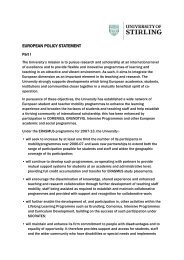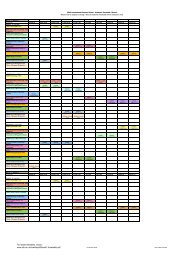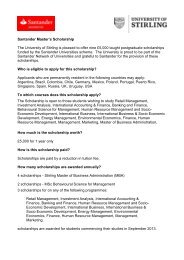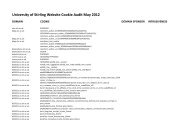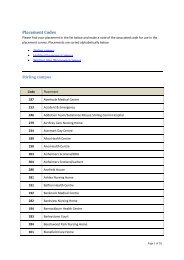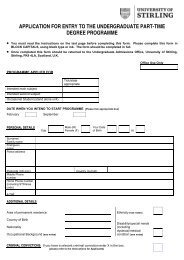Health First: An evidence-based alcohol strategy for the UK
Health First: An evidence-based alcohol strategy for the UK
Health First: An evidence-based alcohol strategy for the UK
You also want an ePaper? Increase the reach of your titles
YUMPU automatically turns print PDFs into web optimized ePapers that Google loves.
<strong>Health</strong> <strong>First</strong>: an <strong>evidence</strong>-<strong>based</strong> <strong>alcohol</strong> <strong>strategy</strong> <strong>for</strong> <strong>the</strong> <strong>UK</strong><br />
chapter 3<br />
The price of <strong>alcohol</strong><br />
Summary<br />
Alcohol producers and retailers use pricing and discounting to sell more <strong>alcohol</strong> and<br />
increase <strong>the</strong>ir profits. In contrast, any government committed to improving <strong>the</strong> health of<br />
<strong>the</strong> public should use pricing policy to reduce <strong>the</strong> af<strong>for</strong>dability of <strong>alcohol</strong> and so reduce<br />
<strong>the</strong> consumption of <strong>alcohol</strong> and its associated harms.<br />
The simplest way to reduce demand <strong>for</strong> <strong>alcohol</strong> is to put <strong>the</strong> price up. Like most consumer products,<br />
demand <strong>for</strong> <strong>alcohol</strong> is inversely related to its price. When demand <strong>for</strong> <strong>alcohol</strong> falls, so too does <strong>alcohol</strong>related<br />
harm, ranging from liver disease to road traffic accidents. Consequently taxation remains an<br />
important and effective tool in reducing <strong>the</strong> harm of <strong>alcohol</strong>.<br />
In <strong>the</strong> long term, however, it is <strong>the</strong> af<strong>for</strong>dability ra<strong>the</strong>r than <strong>the</strong> price of <strong>alcohol</strong> that determines demand<br />
and in <strong>the</strong> <strong>UK</strong> <strong>the</strong> af<strong>for</strong>dability of <strong>alcohol</strong> has increased despite rising taxes. In part, this is due to rising<br />
incomes. However <strong>the</strong> effect of a tax rise is immediately lost if retailers do not pass on <strong>the</strong> additional<br />
cost to <strong>the</strong>ir consumers. This is not unusual within <strong>the</strong> <strong>UK</strong>’s highly competitive retail sector where<br />
discounting and special offers on <strong>alcohol</strong> products have become commonplace in order to attract people<br />
into stores.<br />
A supply of very cheap <strong>alcohol</strong> enables <strong>the</strong> heaviest drinkers to maintain <strong>the</strong>ir consumption despite rising<br />
prices or falling incomes by switching to cheaper products and retailers. It also means that young people<br />
with limited money have access to cheap, strong drink. Of all <strong>the</strong> <strong>alcohol</strong> sold in <strong>the</strong> <strong>UK</strong>, very cheap<br />
<strong>alcohol</strong> products play <strong>the</strong> biggest part in driving <strong>alcohol</strong>-related harm.<br />
<strong>An</strong> effective way of tackling this problem is to set a minimum price <strong>for</strong> every unit of <strong>alcohol</strong> sold, regardless<br />
of where it is sold. This raises <strong>the</strong> price of <strong>the</strong> cheapest products which has <strong>the</strong> greatest impact on<br />
<strong>the</strong> heaviest drinkers. This benefits <strong>the</strong> whole population: <strong>the</strong> introduction of a minimum price of 50p<br />
per unit of <strong>alcohol</strong> would save thousands of lives, prevent tens of thousands of crimes and cut work<br />
absenteeism by hundreds of thousands of days per year.<br />
Public health goal<br />
• Reduce <strong>the</strong> af<strong>for</strong>dability of <strong>alcohol</strong> in order to reduce <strong>alcohol</strong> consumption and its associated<br />
harms.<br />
Recommendations<br />
• Taxes should be used to raise <strong>the</strong> real price of <strong>alcohol</strong> products such that <strong>the</strong>ir af<strong>for</strong>dability declines<br />
over time.<br />
• All bulk purchase discounting of <strong>alcohol</strong> including ‘happy hours’ should be prohibited.<br />
• A minimum price of at least 50p per unit of <strong>alcohol</strong> should be introduced <strong>for</strong> all <strong>alcohol</strong> sales, toge<strong>the</strong>r<br />
with a mechanism to regularly review and revise this price.<br />
17





